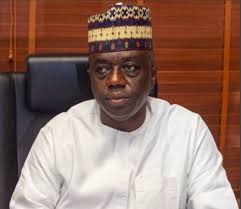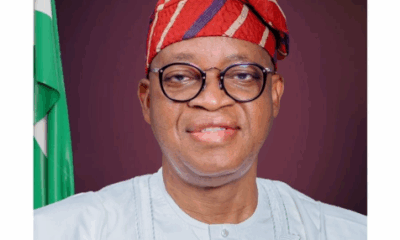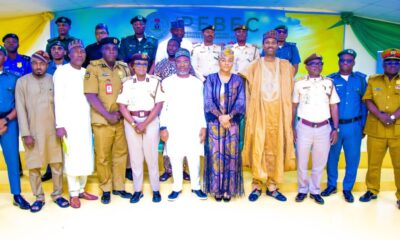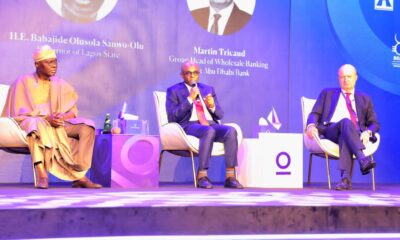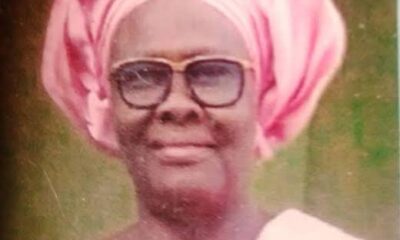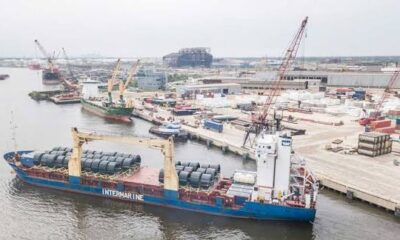Business Maritime
‘Timing Is Critical When Dealing With Key Reforms And Economic Policies’ Shittu
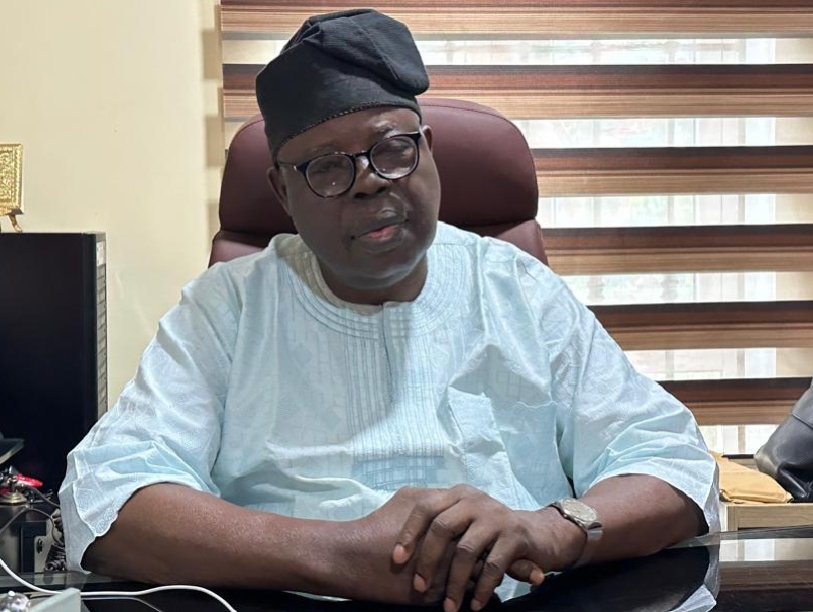
Respected, foremost customs broker and former President of the Association of Nigeria Licensed Customs Agents (ANLCA), Prince Olayiwola Shittu has said part of the problem that ngulfed effort by the federal government to implement the 4percent Free On Board (FOB) levy and the newly introduced unified customs management system codenamed B’Odogwu was due to poor timing by the federal government.
In this exclusive media chat with Eguono Odjegba, Prince Shittu spoke on a number of burning issues in the industry, blaming skewed regulatory oversight for some of the problems bedeviling licensed customs operations and freight forwarding practice which he says are separate professions and should be properly situated to avoid future conflicts and internal rivalry.
He also applauded ongoing efforts to actualize the transition of Nigerian Shippers’ Council into the port economic regulator, which he says is a panacea to some of the age long corruption and efficiencies holding down growth. Excerpt:
Let us start the conversation with the 7% port levy that is generating dust regarding the apparent official forth and back position which removal paved way for the annulment of the 1% CISS 9Comprehensive Import Supervision Scheme) and the raising of Free On Board (FOB) levy from 1% to 4%. What is actually the problem; can you give us an informed perspective to this seeming confusion?
Yeah, even though am not one of the government agencies responsible for determining what monies or levies should be added to customs duty, but over the years it has been done haphazardly as if somebody will wake up from the dream and just slam whatever they want on the hapless Nigerian importers without caring what the aftermath will be. This controversy is unfortunate, it shouldn’t have come at all because right now a lot of people are losing money with demurrage on consignment that are lying down in the port that cannot be carried.
And coming immediately after the issues we’re having with B’Odogwu and the new system they say is indigenized, which is nice –it is good for Nigerians to run their own affairs, which made us support PAR (Pre-shipment Assessment Report)- an indigenous move then, instead of continuing to take dictates from the people who are milking our economy and us.
However, 7% surcharge over the years has been meant for the port development. But sincerely, I’ve never seen any port development from that 7% surcharge because most of the ports that are in place now or in the making are being promoted by state governments looking for federal government support. Even the maintenance of the ports, NPA (Nigerian Ports Authority) is just hollering, claiming so many things. We don’t know whether the money came in from 7% surcharge…and I also know that 7% surcharge also feeds some government agencies, mostly in the transport sector where certain percentages are given out for running of affairs of those agencies which you might need to verify. But when this issue of 4% FOB to be added came up initially, we thought it was going to replace all other charges except Custom Duty. Custom Duty is universal and the percentage you get here in Nigeria might be different from the one in Togo, might be different from the one in Ivory Coast because it is supposed to regulate economic activities of the country, most especially the manufacturing sector. If there are things that are made in Nigeria and people want to import such things here, we use the custom tariff to discourage importation in order to patronize indigenous manufacturing: that is the purpose of Customs Tariff. But how well it is used is what I don’t know. When the CEMA (customs Excise Management Act), this Customs Act was being amended, it was shrouded in certain controversy because most of the efforts we made to reach out to the National Assembly handling the amendments were being rebuffed or sometimes…like it happened yesterday, few people will be informed and that’s how they were able to smuggle in 4% saying it is for the maintenance of customs officers.
And for the love of me, our constitution says all revenues accruing to the federal government, all revenues from whatever way, including the custom duty, will go into the federation account where the allocation committee will now allocate to different sectors according to budget. But behold, when you are not putting 4% FOB? We know 1% FOB what it was, that’s why the beneficiaries never wanted to let go. You know it was a big bite for them, now you increase it to 4%, it was alarming. People cried and then it was suspended. Anything that can be suspended from an Act, it means that that Act is terrible. The Act is supposed to a bill of the National Assembly, in preparing it government is supposed to have reached out to all stakeholders and the various constituencies before ever it is passed. Now you passed it, you say go ahead, implement…and again, don’t implement, people are crying; now you must implement whether they like it or not.
It is easy for us customs brokers to say okay, go ahead…we sit down and look because the end sum is that those who bring in goods into the country will continue to lament…‘what is going on with our nation.’ We are not producing and the ones we are producing we are not managing them well, all we are interested in is how much is in it for whoever is interested. So it is very sad. From my own enquiry, 7% surcharge is still there, 4% is added, all other previous charges apart from the 1% FOB that is CIF based, all the rest are still there. But is left for you to meet customs to show you evidence that they are not there. From what we know today, most of them are still there.
The implication is that customs brokers and other allied port players will continue to pay the prescribed levies as it is?
Yeah because we don’t have the common voice…how can we fight? It is very difficult for you-most of the things we do is to point hands at what is wrong but we are not in a position to right the wrongs. There are so many how would l put it… avenues for government agencies to say you are anti-government in whatever you try to do even when the government will benefit in the long run. It is because of the way the government itself is running its affairs and we are not seeing the impact of all the hikes in fees and that stuffs. Our association (Association of Nigerian Licensed Customs Agent) had had meeting with the CG Customs, they say they are still going to have more meetings…some of us are also contributing suggestions behind the scene. I know the amount involved, not the one of the Act of the National Assembly but things like renewal of customs license, acquisition of new customs license, bonded terminals license, etc etc-those ones too may have to be reconsidered because those are fees that are engineered by the customs itself. And if we are able to articulate our position…the CGC is a human being, if at the end of the day he does, he did not do, one day, he will go.
In 2004 when the last increase was done, Ahmed Abubakar was the CGC, Aare Sanni Shittu was ANLCA President…as at that time…it was taken for granted, but now that people have to coughed out N4million to renew a license yearly-that is giving room for money bags to take over the industry, giving room to those who have illegal funds to take over the industry, and for the foreigners to take over. And if you are looking at the industry we have in the nation today, customs licensed agents are employers of labour, in our company l know how many staff are there that we cater for, so also many others customs licensed agents. And when you are a customs licensed agent, apart from the fact that he gets his license, there are stipulated expectations-you must have an office, you must train staffs, you must attend training along the line, you must pay renewal fee, and so on and so forth.

It is quite different when you say you are a freight forwarder without customs license. How do you operate in the industry if you are just a freight forwarder by name and then, you don’t have a customs license? This is because you feel you can operate in the industry without been regulated especially by the customs service under whose purview cargo clearance is carried out. So what is the job you’re doing in the port, is it transportation? Everybody should be able to explain his role in the industry. If you’re a licensed customs agent you should be regulated by customs, if you are a freight forwarder be regulated by CRFFN- you don’t need to and meet customs to say you are a freight forwarder, l don’t need your license, come and clear documents for me, no. What for, it won’t work. So it is the inability for people to accept reality that in our industry, there are varying positions. Customs licensed agents are owners of companies licensed by customs and there is no operation you do in the port that you do not have customs involvement, because it is the customs agent that goes to all agencies of government for one transaction or the other based on his customs license.
I was actually going to ask the question why the authorities are ignoring the difference between freight forwarders and customs agents both of who are doing the same job of cargo clearing, isn’t this a regulatory failure or should l say compromise? Why is the Nigeria Customs Service dealing with freight forwarders not registered to clear cargo by it? Part two of the question l aim to ask is about the lingering rivalry between NAGAFF (National Association of Government Approved Freight Forwarders) and ANLCA-there is a whole lot of confusion…
There is no confusion, a regulated industry does not give room for corruption because there are rules and regulations on what you are expected to do and what you should not do. But the unregulated part of the operation is the one that makes you popular, because you’re there illegally, throwing around money in order to get things done. An unregistered individual, that is not registered by customs, they find their niche in freight forwarding…whatever jobs they do in our ports called freight forwarding l don’t know. But if you look at the history, every one of this people have been a member of ANLCA one time or the other. And people seize the opportunity of oh, ANLCA goes with prestige, but the competition is tight, if you’re to be the chairman of Tin Can in ANLCA, there are good things that can come and l use my influence that will sped up any job l have. So what they do, rather than queue up for their time…politically, they go away to establish their own associations, of recent another association has come up and another one will come up, because there is, unfortunately, freedom of association and expression in the constitution that is been misused. But when these freedom are becoming nonsensical, society shall ask question and place a limit, can you are not a lawyer can you belong to Nigerian Bar Association (NBA)?
So where we should have started is…before you call yourself a practitioner, you must work in a company that is licensed by Nigeria Customs and you must be either the CEO or a Director that can stand for liability…in case any company that is licensed by the Customs goes haywire who are the promoters to hold? But when you are just a portfolio carrying member of an association and probably your brother is an importer, or your brother has influence in cornering documents for jobs and with your nomenclature of saying ‘l am a clearing agent’, he gives you the document. You start looking for a customs licensed company to use to company assigned code for you to be able to do declaration.
And this confusion appears to be one of the fundamental design flaws confronting the Council for the Regulation of Freight Forwarding in Nigeria (CRFFN), why were these issues not looked into during the public debate ahead of the passage of the CRFFN Bill into an Act?
I was resident in Port Harcourt when the bill was being considered. But without minding then inconveniences we flew to Abuja several times, myself and the then ANLCA National President, Chief Elochukwu to also make our own position, but Lagos is where everything happens, so those who were interested cornered the system, using the presence of Nigerian Shippers’ Council (NSC) and with some private lawyers to go and confuse the lawmakers behind the scene that ‘look everybody that is coming must be a freight forwarder. What you need to find out first, who is a freight forwarder?
A simple dictionary meaning of freight forwarder –you will see it there-somebody who is doing the performance of the movement of cargo from one place to the other; and the documentation. But they captured the documentation as customs documentation, but how do you get customs documentation done? Is by being regulated by the Customs, they removed that one quietly, and did amendment later to say ‘if you are doing documentation as licensed customs agent’. Because even the Professional Operating Fee (POF) which was being collected by CRFFN and with which Lucky Amiwero went to court, was not in the original Act, it came in as Passing Resolution, and who are the people that will pay the money? It is the licensed customs agents that are responsible for clearance and delivery of goods. Along the line when l came on board as the president then, we looked at the thing and said no, the best way to go…we should not have a marriage of convenience, NAGAFF with all your members go and take them with CRFFN, ANLCA with all other associations of licensed customs agents, you go ahead and be regulated by the Nigeria Customs Service. But they knew it was going to be difficult – during the time of Chibuike Amaechi as minister of transportation, he fought against it because he was already calculating how much income will come to the government. And that was the failure…because of that Lagos ambush on the Act is the reason the ministry did everything it can do to bring CRFFN into their control.
The only clause that requires government intervention is if there is a dispute within the CRFFN Board and it becomes intractable, the minister of transport (marine and blue economy) can move in and rule in finality but not without consultation with the board members. So the independence of the Council was already established by the Act but then the Registrar played into the hands of those who wanted to use government to feather their nest. That was why a lot of people were driving government vehicles as part of the largesse that the government was ready to dispense.
So along the line, it is like a contour that you discover on a bent load on the head because right from the beginning, he messed up. Now those who were thinking they will now make money out of the operation of CRFNN discovered that they have also been outplayed.
Before Amaechi, there is something I need to emphasize, the Council itself with the Registrar found out to a consultant the collection of POF even with this disenchantment of the operators, especially our licensed custom agents, who knew that some people are just collecting this money for their own personal use. Can you imagine a government agency that CRFFN has come to be now will engage a consultant and allegedly collecting 40% as their own agency fee for the purpose of collection. Can you imagine what that means? Several meetings were done where ANLCA said okay, ‘on behalf of our members at the end of the year, give us a percentage of our contribution so that we can use it to renew our licenses, pay rent for our offices, pay workers, etc. Even though there was a tacit agreement the other associations that may not be favorably disposed to it are those who may not gain from it because they don’t have a custom license with which to record the monies to pay. They kicked against it. And that’s what has happened to the CRFF not been…CRFFN has been turned to an organization solely to collect money, that’s all. All those empty talks we shall train you, we can do this, we can do…let me tell you, Customs have a training school. It is the customs that should be training their brokers as it’s done in America, as it’s done in South Korea, as it’s done in England. Why is our different to as it is done in Togo and Liberia. It is custom that will bring curricula because a member of the staff of each license company must be conversant with customs procedures and every other thing now that they have even gone super technological. So, it would take a hard stance like what we have told the CG to go and do…please go and meet your counterparts or inter-ministerial arrangement let them divide this operation. If you know that you don’t have a license companies bring out the list of your custom representative, that’s what they call it, customs representative should be one person in your company that is trained because you can set up a company and you are not running the company; you know that.
Yeah
But somebody in that company must be conversant with custom procedure. Those are the ones that go for training, Those are the ones that will maintain your system. Those are the ones that have been working internally and following up what new regulation custom bring in. But if you are just a freight forwarder you can collect money from somebody concerning a job, abandon it, go across the border and disappear. Many people are doing it because no trace. I as the MD of Skelas now, between me and you, I cannot disappear if I’m doing customs because they have all the records, they have everything to trace me. I am not the company but I am leading representing the company. But if you see Fadahunsi Nigeria Limited and it’s just a portfolio, no custom license and you are relying on CRFFN whose only interest is how much money people are paying…who should be in CRFFN? Workers operating in the port, especially now that Maritime Workers Union had even, you know, involved them in their trade union. So you don’t need any association Maritime Workers union. So you don’t need any association other than the maritime workers union because they are working in the maritime. The staff in Skelas can be members of maritime Workers union but the representative, the superior representative of Skelas must be registered and controlled by the customs. If they don’t remove that, the same issue will continue over the years because people are using the positions to influence how the job is being done in the port.
…TO BE CONTINUED TOMORROW

